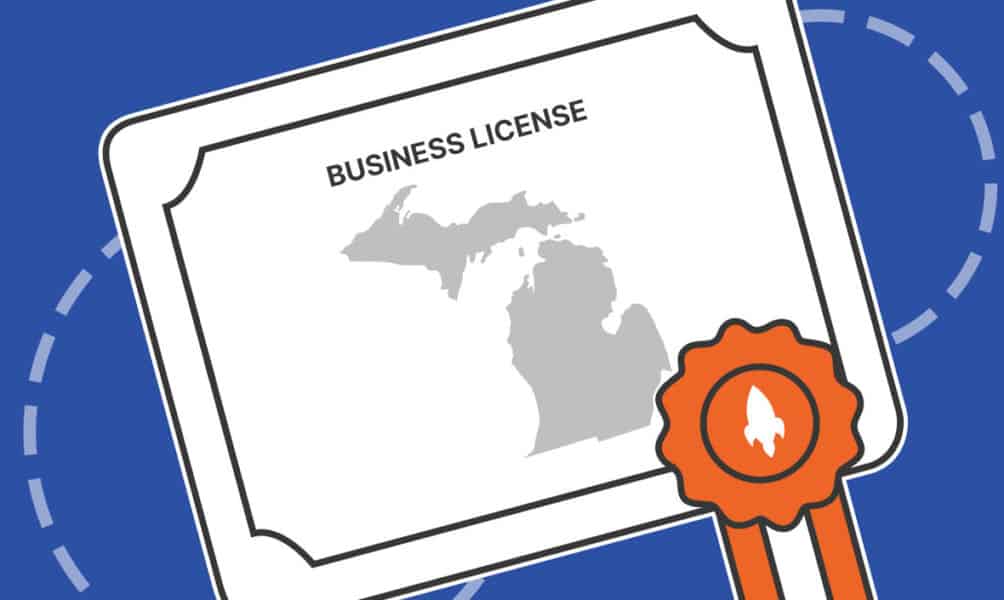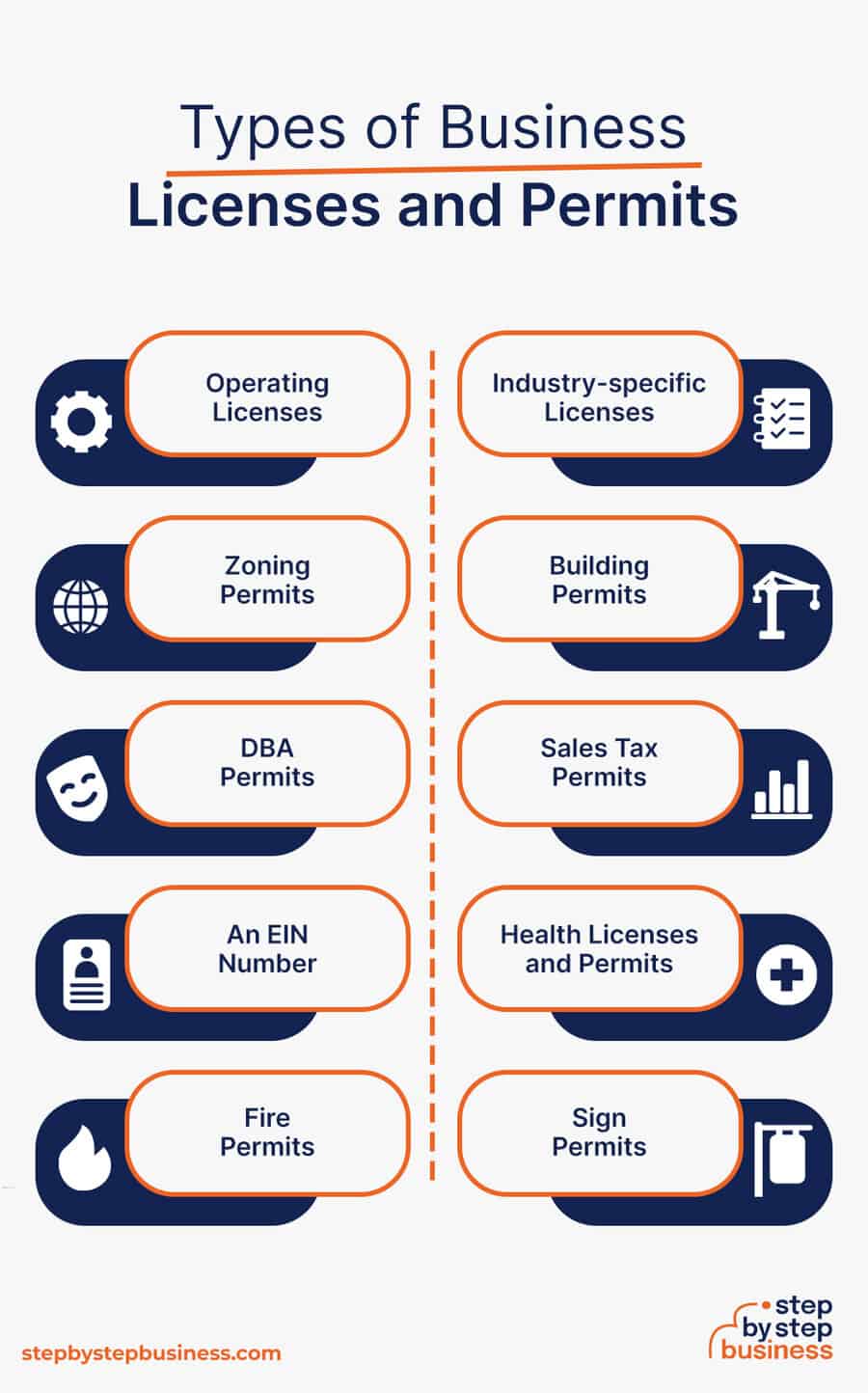Here are the steps you need to take to start a limited liability company (LLC) inMichigan: Choose a name for your Michigan LLC: Your businessna ...
How to Get a Business License in Michigan
Written by: Coralee Bechteler
Coralee is a business writer with experience in administrative services, education, and software testing.
Edited by: David Lepeska
David has been writing and learning about business, finance and globalization for a quarter-century, starting with a small New York consulting firm in the 1990s.
Published on July 11, 2022

One of the most important elements of starting a business in Michigan is making sure you have all the requisite licenses and permits. The requirements vary by state, some of which have as many as 300 different licenses and permits.
This article is too short to list them all, but it’s crucial that you’re aware of which ones your business needs and that you follow the steps for application and put your business on the road to success.
In Michigan, businesses need certain licenses and permits to legally operate as a business. The regulatory hurdles required vary depending on the type of business, its location, and the products and services offered.
To help you launch your new business, this article lays out the most commonly needed permits and licenses in Michigan — and details the steps required to acquire them.
Why are business licenses required in Michigan?
Business licenses and permits are issued to certify that a business and its products and services are safe for the public. This explains why food businesses, for instance, require more licenses than most other business types.
Which agency issues business licenses in Michigan?
In Michigan, the Department of Treasury issues the vast majority of licenses and permits, though some are issued by the Department of Licensing and Regulatory Affairs as well as the Department of Agriculture & Rural Development. For instance, the Secretary of State issues truck driver’s permits.
Some licenses and permits are issued by cities or counties. So, if you live in Detroit, you’ll need to check with the city to see if licenses or permits are required for your business.
Before you apply, it’s important to know which state or local agency issues the license you need. Check the state’s guidelines here to learn more.
You could also check this SBA guide for your state’s requirements, but we recommend using MyCorporation’s Business License Compliance Package. They will research the exact forms you need for your business and state and provide them to ensure you’re fully compliant.
Steps to Get a Michigan Business License
In Michigan, the steps for acquiring specific licenses and permits vary widely, so it’s important to be aware of what you need and how to get it.
Determine the Types of Licenses That You Need
In Michigan, businesses intending to conduct sales will need a sales tax license.
The additional licenses your business needs in Michigan will reflect the general type and nature of your business. For example, a convenience store seeking to sell prepared food must first acquire the necessary licensure.
To safely run your business, it’s essential to review both state and county requirements and verify that your business is properly licensed.
Types of Business Licenses
Your business may need local, state, and/or federal licenses and permits, depending on your type of business. Fees for these vary, but most costs are minimal.

Federal regulations associated with starting your business include doing business as (DBA), health licenses and permits from the Occupational Safety and Health Administration (OSHA), trademarks, copyrights, patents, and other intellectual properties, as well as industry-specific permits.
The most common permits and licenses include:
- Business operating licenses may be required by the city and the state to allow you to operate.
- Industry-specific licenses may be required, depending on your type of business. Businesses involved in construction, childcare, plumbing, electrical, food and liquor, insurance, finance, landscaping, and architecture all require licensing, for example. In some highly regulated industries, you may require licensing from a federal agency, such as the FDA or the Department of Transportation.
- Zoning permits are issued by municipalities to ensure you’re operating in an area in which you’re allowed to operate.
- Building permits verify that the building you’re operating in is up to code. Home occupation permits, which some areas require, allow you to operate a business from your home.
- DBA permits allow you to do business under a name that is different from your legally registered business name.
- Sales tax permits allow you to sell products and collect sales tax.
- An employer identification number (EIN) is required if you plan to have employees, no matter what your business entity type.
- Health licenses and permits are required for certain businesses based on industry, and you will be required to maintain health and safety standards. Environmental permits are also required for certain industries in some locations.
- Fire permits certify that your business is up to fire safety codes. Depending on your location, this may be required for all businesses, while in other areas, it’s required only if you work with flammable materials.
- Sign permits may be required for your location or other signage if there are rules about sign size and location.
Check with the state and local government offices for specific requirements for your location and industry.
Submit Your Business License Application
Businesses in Michigan can apply for a sales tax license online here through the Department of Treasury.
Additional licenses are filed with various departments of Michigan, so it’s best to double-check where to file a given form with Michigan’s Licensing and Regulatory Affairs Agency. You can also contact the agency directly for more information at the number below.
Phone: 517.241.6470
How much does a Michigan business license cost?
Business license fees vary in Michigan depending on which license is being applied for. Costs span a broad range, from just $0 for a sales tax license to $471 for a wholesale food processor license.
In Michigan and most US states, jumping through all the hoops to acquire the necessary licenses and permits can be exhausting. But if you want to operate your business, you’ll have to wade through all the red tape. So get started on these regulatory hurdles as early as possible and clear the way for your entrepreneurial journey to success.
How fast can I get a business license in Michigan?
If you apply online for a sales tax license for your business in Michigan, you can expect processing to take about seven business days. Conversely, If you file by mail, it can take weeks.
For other licenses in Michigan, the processing time varies. For example, distributor licenses can take up to six weeks to process. Filing online can help speed up the licensing process for your business.
Renew Your Licences When Needed
In Michigan, license renewal requirements vary, but many are required to be renewed every year. For example, sales tax licenses expire every year on September 30th, and businesses with food establishment licenses must also renew their licenses annually.
Renewal fees differ among licenses in Michigan, so it’s best to check with the state about your business’s license needs.
Subscribe to Our Newsletter
and gain insider access to cutting-edge business insights and trends.
Featured Resources
How to Start an LLC in Michigan in 7 Steps
Published on March 4, 2022
Read Now

Starting a Business in Michigan: 13-Step Guide
Published on October 6, 2021
Michigan is known for its namesake lake and for being split into lower and upper peninsulas. But you probably don’t know that it has one ofthe ...
Read Now
Comments